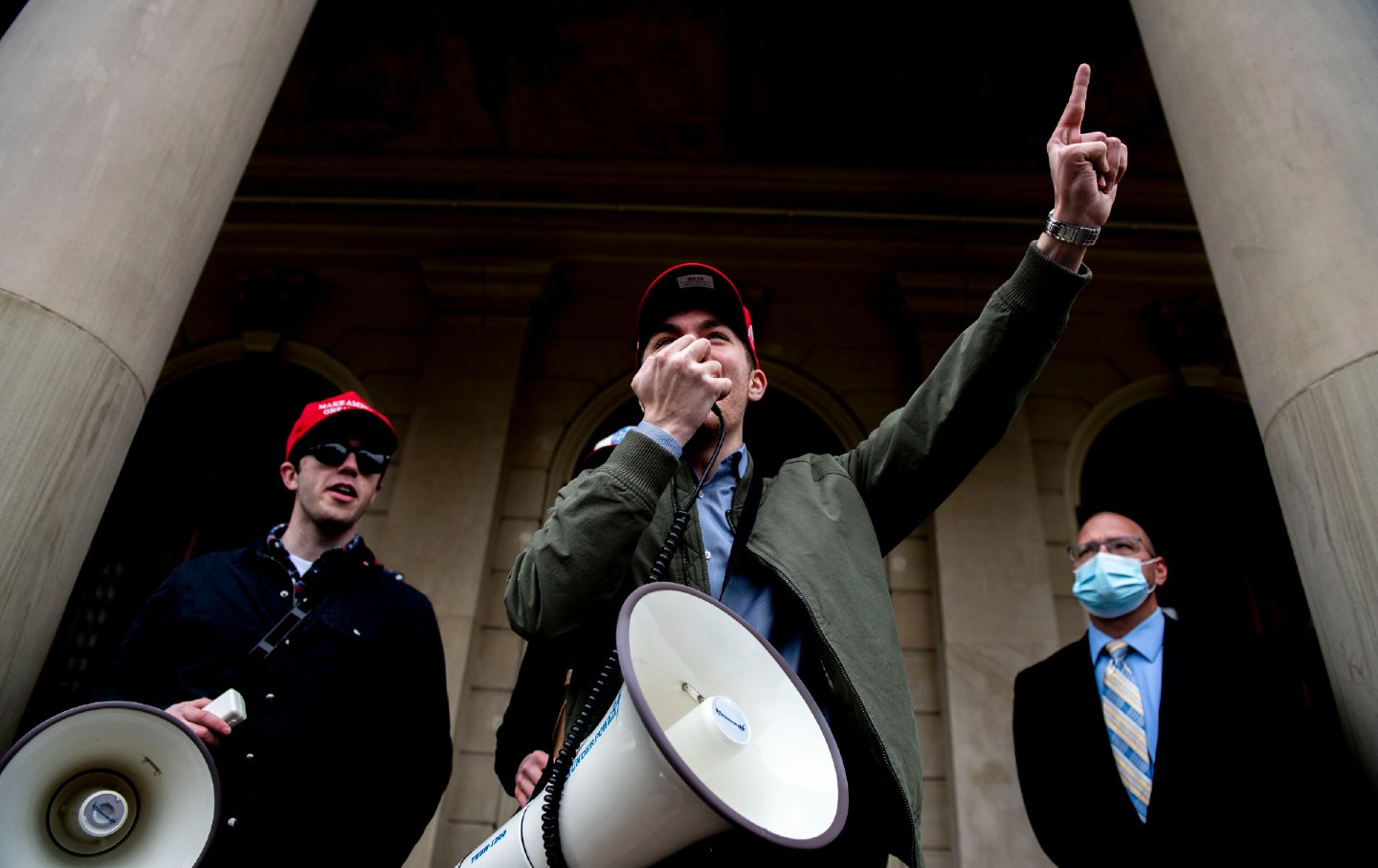Politics / November 4, 2025
How the right’s crisis over US support for Israel has provided the white nationalist with the opening he needs to be welcomed into the MAGA fold.

White nationalist Nick Fuentes speaks during a rally at the Capitol in Lansing, Michigan, November 2020.
(Nicole Hester / Mlive.com / Ann Arbor News via AP)
Last week, a major ideological schism that has been brewing beneath the surface of the MAGA movement burst into full public view. On one side: a rowdy and ascendant coalition of ultra-nationalists, populists, and Gen-Zers who are clamoring for an end to US support of Israel. On the other: the neoconservative, Zionist old guard who are increasingly marginalized and on the defense. As the clash rattles the MAGA coalition at its highest levels, one man stands at the center, enjoying the mayhem: Nick Fuentes, the 27-year-old white nationalist streamer whose moment has finally arrived.
It started on the evening of October 27, when Tucker Carlson hosted Fuentes for a friendly two-hour interview. Since his departure from Fox News, Carlson’s online show has become the highest-profile platform in the MAGA movement. But until very recently, Fuentes’s appearance there would have been unthinkable. The Hitler-praising, Holocaust-denying streamer has long been considered virtually untouchable by the conservative mainstream, even while he has commanded a sizable following among disaffected, ultra-racist, extremely online Gen Z men. In August, Carlson himself slammed Fuentes as a “weird little gay kid in his basement” and suggested he was likely a federal agent.
Since then, Carlson has changed his tune. During last week’s interview, he apologized for past remarks about Fuentes, emphasized common ground, and offered only tepid pushback against Fuentes’s theories about “organized Jewry.” As the video garnered millions of views, the mainstream conservative movement responded with a burst of debate, with many supporting Carlson’s move while MAGA’s establishment, pro-Israel voices expressed outrage. Carlson and Fuentes, wrote Newsweek pundit Josh Hammer, were “cheering on the West’s Islamist and globalist enemies…[and] fracturing…the ecumenical Jewish-Christian biblical alliance.… I have no doubt that [Charlie] Kirk is now rolling in his grave after Carlson’s latest stunning act of anti-Western subjugation and personal betrayal.”
Then, on Thursday, Kevin Roberts, the president of the Heritage Foundation, took to X to defend Carlson’s decision to platform Fuentes, arguing that the groyper leader’s ideas should be respectfully debated within the conservative conversation, not shunned. American Christians should be free to criticize Israel, he asserted, without being called antisemitic or silenced by the “globalist class,” since “loyalty” to “Christ first, and to America always” is paramount. The first part of that assertion, no doubt, is true enough; the second carries unmistakable antisemitic overtones, a brand of anti-Zionism more reminiscent of Father Coughlin than of anything the liberatory left would celebrate.
If you follow the right only from a distance, this all may seem like a storm in a teapot. Why parse subtle distinctions between shades of racists while the world burns? But Fuentes’s welcome into the MAGAverse augurs a profound shift on the right. Beyond the interview itself, the debate has brought into the open long-simmering tensions between what are commonly called the neoconservative and paleoconservative wings of the MAGA movement, touching not only on foreign intervention but also issues of immigration, trade policy, culture wars, and more. It has become the opening salvo in the battle for Trumpism after Trump, forcing onlookers to choose between two increasingly irreconcilable visions of America First.
It’s a profound development. In just a week, Carlson has introduced the groyper leader’s ideas—outright neo-fascism and unbridled white, male, and Christian dominance—to an immeasurably wider audience, helping the skilled propagandist appear reasonable, even moderate. And in offering his blessing to the interview, Roberts gave further permission for the rest of the conservative movement to follow suit.
Of course, in many ways it’s surprising that Fuentes’s red-carpet welcome took this long. In fits and starts, with plenty of misses and plenty of luck along the way, he has been clawing his way toward the top for years. He has done this not primarily through building a mass base or taking over conservative institutions but through what the alt-right called “metapolitics”—seeding radical ideas in culture until a moment of crisis provides an opening for wider dissemination. Now the right’s crisis over US support for Israel, after two years of genocidal annihilation in Gaza, has provided him the opening he needs.
Pushing the Envelope
In the early months of the 2016 election Fuentes, then in high school in the Chicago suburbs, was a libertarian and Ted Cruz supporter. By the time he got to college later that year, he was all in for Trump, and like many others in the heyday of the alt-right, his views quickly radicalized. And by August 2017, when he attended the Unite the Right rally in Charlottesville, Virginia, he was a full-on white nationalist. Because of his views on immigration, race, and Israel and the Jews, he was barred from the career pipeline open to less radical conservative students. Soon he dropped out of college and began his nightly streaming show, America First, determined to reshape the conservative movement from the outside.
In fall 2019, Fuentes made his first mark by helping orchestrate what came to be called the “groyper wars.” At Turning Point USA events on campuses across the country, his followers—adopting the “groyper” moniker, an online variant on the ubiquitous alt-right Pepe the frog meme—lined up during the Q&As to challenge Charlie Kirk and other conservative leaders to end their support of non-white immigration and Israel, ditch the rhetoric of “color-blind” inclusivity in favor of hard-nosed white grievance politics, and remove gay conservatives from leadership positions on the right. These confrontations were filmed and went viral, and while conservative leaders lined up to condemn Fuentes—pointing to clips of him joking about the Holocaust, calling interracial marriage “degenerate,” and more—his influence on portions of the MAGA youth was hard to deny. The media proclaimed the rise of a new Gen-Z ultra-reactionary right.
By 2019, most leaders of the earlier alt-right, like Richard Spencer, had become toxic and untouchable to the conservative mainstream, their organizations, like Identity Evropa, decimated by doxxing, deplatforming, and lawsuits. The groypers, by contrast, seemed clean-cut, savvy, and optics-conscious, rebranding white Christian nationalism in the more palatable veneer of flag and cross. They were popping up in the ranks of Turning Point USA and campus Republican chapters, where Fuentes wisely cautioned them to “hide their power level” and push the organizations further rightward. Despite the many attempts to banish them, it seemed, the inheritors of Unite the Right had found a way back into the conservative tent, determined to transform it from within.
After their splashy debut, the groypers further flexed their muscles in the lead-up to January 6. Fuentes held “Stop the Steal” rallies at state capitols and arrived at the insurrection with a gaggle of followers, bellowing marching orders into a megaphone outside the Capitol gates while thousands of rioters, a few groypers among them, stormed the barricades. Although this ultimately earned him a subpoena from the January 6th Committee, it failed to tarnish his reputation among the more extreme, fascist-curious members of the MAGAverse.
MAGA politicians like Paul Gosar and Marjorie Taylor Greene spoke at his annual conferences that year and the next. Meanwhile, the right was radicalizing. Establishment conservatives like Carlson and Kirk began cautiously, then triumphantly, embracing “great replacement” and Christian nationalist rhetoric, even as they avoided Fuentes directly. Many conservatives began arguing that their movement should hold “no enemies to the right”—the idea being that conservatives could no longer afford to expel radicals from their ranks, but must unite with them to crush the left.
During this time, Fuentes positioned the groypers as a tugboat, sailing one wave ahead of the conservative mainstream, seeding radical ideas in its wake. “My job, and the job of the groypers and America First, is to keep pushing further,” he told his followers in a May 2021 broadcast worth quoting at length.
We—because nobody else will—have to push the envelope. And we’re gonna get called names. We’re gonna get called racist, sexist, antisemitic, bigoted, whatever…and when the party is where we are two years later, we’re not gonna get the credit for the ideas that become popular…but that’s ok. That’s our job. We are the right-wing flank of the Republican Party, and if we didn’t exist, the Republican Party would be falling backwards all the time…So we have got to be on the Right, dragging these people kicking and stream—kicking and screaming into the future, into the right wing, into a truly reactionary party. And it’s incremental—we’re not gonna drag them all the way over—but if we can drag over the furthest part of the Right further to the Right…then we’re winning.
Still, despite the bravado, Fuentes’s movement was soon floundering. Like many radical rightists, Fuentes found himself banned from social media platforms like Twitter and YouTube that, at the time, prohibited hate speech and other bigoted content. He was forced to create his own streaming platform, Cozy TV, to host his content. His nightly viewer count dwindled, a common effect of deplatforming. At the same time, his public feuds with one-time allies, like former Identity Evropa leader Patrick Casey, left him increasingly isolated.
Eager to raise his profile and distinguish himself in a crowded field of rapidly radicalizing right-wing pundits, he eventually settled on open pro-Hitlerism. A spate of bizarre public appearances with Ye (formerly known as Kanye West) in late 2022, where the two praised Hitler during interviews on popular right-wing podcasts, brought him back into the headlines, but not, it seemed, in a good way. When news broke that Fuentes tagged along as Ye’s guest at an invited dinner with Trump at Mar-a-Lago, the national media hyped the groyper leader as an influential MAGA whisperer.
But the young activists staffing newly ascendant hard-line MAGA groups like Republicans for National Renewal and American Moment dismissed his neo-Nazi antics as toxic and cringe. A new nationalist MAGA flank was emerging, led by movements like National Conservatism and figures like JD Vance, determined to take back power in 2024. This was the right-wing flank of the Republican Party that Fuentes needed to reach, but instead of inching closer, they recoiled from him. He lobbed fiery critiques and orchestrated public stunts challenging these new MAGA populists from the right, but nobody seemed to care. With increasingly extreme positions catering mostly to a loyal audience of basement-dwelling incels, Fuentes seemed to revel in his marginality. No longer the master mainstreamer, he seemed to be treading the same desultory path towards irrelevance carved out by the likes of Richard Spencer and David Duke before him.
Seizing the Moment
That changed after October 7. While much ink has been spilled tracing the tectonic shifts Israel’s genocidal annihilation of Gaza triggered in the liberal camp, the longer aftershock on the right may prove just as consequential. By this point, Fuentes’s core calling cards of white-Christian nationalism, ultra-misogyny, and anti-LGBTQ bigotry had gone mainstream on the right, but open antisemitism remained the last real firewall. Before 2023 had ended, however, cracks appeared there too. Charlie Kirk blamed “Jewish dollars” for funding “cultural Marxist ideas” at universities, while Elon Musk boosted a tweet claiming that Jews possessed “dialectical hatred” against whites. No longer satiated by the conspiracism around George Soros and “globalists,” conservatives, it seemed, were sampling the harder stuff.
By now, it is common knowledge that Gen Z conservatives have soured on Israel. But while pundits often cite Candace Owens and Tucker Carlson as auguring this transformation, Fuentes, in fact, had peddled America First anti-Zionism long before it was cool, and in its undiluted, hard-line antisemitic form. More than anything else, the right’s steady lurch toward Israel-skepticism has fueled Fuentes’s recent rise. And unlike on the left—where anti-Zionism is primarily motivated by solidarity with Palestinians and the demand for universal justice, and care is generally given to separate Judaism from Zionism—on the right it comes infused with hard-nosed revanchism, bristling with rage at a Jewish cabal that, it insists, has sold out American greatness in service of slavish devotion to Israel.
Sensing the changing winds, Fuentes branded himself a prophet outcast, an insurgent rebel against the “Israel First” neoconservative (read Jewish) establishment, banished to exile for speaking truths long before latecomers like Tucker were ready to listen. He was aided in these efforts by Elon Musk’s decision to effectively end content moderation policies on X, which allowed groypers to return to the platform in droves, followed eventually by Fuentes himself in May 2024. And since Trump took office, he has continued to ride the news cycle to his advantage. His noisy opposition to US involvement in Israel’s war on Iran in June 2025 won him new adherents. As fiery debates accelerated the split over Israel on the right, Fuentes distinguished himself by arguing that less radical noninterventionists like Charlie Kirk and Steve Bannon remained too tepid, unwilling to tackle “Jewish power” head-on.
After the murder of Kirk in September, all eyes were on Fuentes as speculation briefly surged that the suspect was a groyper. Despite his long-standing bitter, often vitriolic rivalry with the TPUSA leader, Fuentes surprised and impressed gullible onlookers by decrying political violence and cautioning against the conspiracy theories that proliferated in MAGAland following the murder. His bid to appear moderate and reasonable paid off, with a large boost in X and Rumble followers and friendly appearances on a few prominent MAGA platforms. Meanwhile Carlson and Owens, likely sensing a threat from their right flank, roundly attacked Fuentes on their shows. But this backfired when Fuentes successfully punched back, casting his critics as establishment shills and emerging all the shinier from the closely watched scuffle.
Now it’s hard even for his critics to deny which way the wind is blowing. Two days after Fuentes’s interview with Carlson,JD Vance was hit with questions during an appearance at a TPUSA event in Mississippi that seemed to recapitulate the 2019 groyper wars; to loud applause, several students asserted that Israel was “controlling” Trump and Judaism was “prosecuting” Christianity, and a defensive Vance ceded at least some of the ground. “When people say that Israel is somehow manipulating or controlling the President of the United States, they’re not controlling this President,” he said. Whether these students were themselves groypers is irrelevant; Fuentes’s message had broken through to the future foot soldiers of the conservative movement.
Just a few days after that, however, Kevin Roberts was forced to backpedal after being hit by backlash from Heritage Foundation staff, board, donors, and other conservative leaders. He swiftly condemned Fuentes, maintaining only that the groyper leader’s views, clearly resonating with young conservatives, must be challenged head-on in the marketplace of ideas. And yet, the fierce reaction from old-guard conservatives also helps bolster Fuentes’s insurgent brand. The fiery, acrimonious debates are polarizing the conservative movement exactly along the lines Fuentes has long intended. Once again, he is the “right-wing flank of the Republican Party,” as he hoped to be in 2021, dragging MAGA “kicking and screaming” into an even more reactionary future.
The Art of the Possible
In his relentless quest to “push the envelope” of American nationalism, Fuentes has long zigzagged between posturing as Trump’s most loyal, vanguard soldier and as MAGA’s fiercest, most bitter right-wing critic. Fuentes is unlikely to trade in his cherished outsider status for a seat at the establishment conservative table anytime soon. But Carlson and Roberts’s moves will deepen his influence across the jostling crowd of streamers, operatives, and administration officials that make up a chaotic and rapidly radicalizing MAGA ecosystem.
Sensing the opening, the groyper leader has been attempting to sanitize his own history. In interviews with Carlson and others, he downplays his extensive back-catalogue of bare-knuckle bigotry as youthful exuberance. He ludicrously claims to hold no hatred in his heart, and cautions against those fringe, increasingly noisy voices on the Internet who do. At the ripe old age of 27, he frames himself now as the wizened whisperer of alienated young men, counseling elders like Carlson on how to bring them back into the conservative tent.
Popular
“swipe left below to view more authors”Swipe →
On one of his September shows, he outlined a more pragmatic approach that, in truth, the left would do well to adopt as well:
If the constraints are that every show has to be fire and brimstone, pure resentment, rage, always more extreme, always more insane, always more resentful, you don’t want change. You just wanna feel validation, you wanna feel your resentment to be acknowledged and heard. Part of what I do is for that. But if that is not channeled in a productive and prudent way, on a long-term timeline with tangible results, then what the fuck are we doing?… I’m not satisfied with just playing the greatest hits for the most radical 1% (of diehard fans). We’re trying to move the needle of an entire nation.… I’m interested in the art of the possible, not the fantasies of people who just want to hear their grievances heard.
Before his death, Charlie Kirk had skillfully sought to mediate growing tensions between the restless, Israel-critical Gen-Z MAGA youth and their establishment elders, between the rowdy, Epstein-obsessed populists in Trump’s base and the legacy neoconservatives with closest access to Trump himself. In his absence, that role is vacant. Fuentes likely knows that that if he cleans up his act just enough, at least for a time, he can waltz into the conservative mainstream and command the floor. He might be right.
In 1991, conservative kingpin William F. Buckley Jr. established the rightward boundary line of the post–Cold War movement consensus by effectively excommunicating paleoconservatives like Pat Buchanan and Joe Sobran over their dalliances with Holocaust revisionism and Israel-critical antisemitism. Buchanan, in turn, fresh from a high-profile presidential bid, distanced himself from white nationalist David Duke, who won a surprising 55 percent of Louisiana’s white vote in the 1991 gubernatorial runoff election. But he also called on the GOP to imitate Duke’s success: “Take a hard look at Duke’s portfolio of winning issues; and expropriate those not in conflict with GOP principles,” he advised conservatives in a column.
Buckley’s postwar conservative consensus has now crumbled. Any pretense of distance between the mainstream and radical wings of MAGA is collapsing. With Fuentes’s embrace by Carlson—a Buchanan-like figure who positions himself as a waypoint between today’s right-wing radicals and the conservative establishment—the Overton window, as it’s popularly called, hasn’t merely shifted; it’s shattering. That it took right-wing anti-Zionism to break the glass should give progressives little reason to celebrate, as the right’s Israel-critics aren’t our allies. As Fuentes told Carlson on his show, they want to throw the left in prison, or worse—and their sympathy toward Palestinians, while sometimes heartfelt, is also selective and ultimately instrumental, furthering a Western chauvinist and deeply exclusionary agenda.
Liberals and progressives can still learn something from Carlson and Roberts, however: It doesn’t pay to shut out your radicals, and it won’t work. Millions of Americans, young and old, are fed up with bipartisan support for Israel, unprecedented inequality, and the other morbid symptoms of decaying empire. The establishment has no answer for this widespread and mounting alienation, because the establishment is the cause. Only fresh, outsider ideas can meet this moment, and they’re popular. But while left-wing insurgents still struggle to get past our side’s gatekeepers onto larger platforms of influence, radicals like Fuentes are finding less resistance on the right. If we don’t want their answers to win the day, we don’t have much time left.
Ben Lorber
Ben Lorber works as senior research analyst at Political Research Associates, a progressive think tank monitoring right-wing movements, where he focuses on white nationalism and antisemitism. His book Safety Through Solidarity: A Radical Guide to Fighting Antisemitism will be released in 2024 with Melville House Books.






